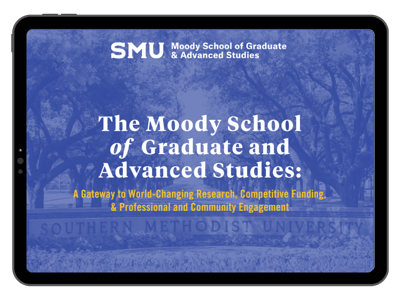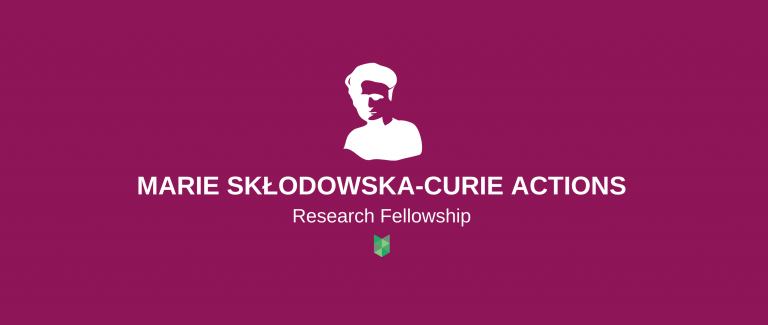- Skip to main content
- Prospective Students
- Current Students
- Apply Apply
- Follow Us


How to Find PhD Scholarships and Grants

Financing your PhD studies can be challenging, but it's essential to your academic journey. Scholarships and grants can ease this burden, although finding and securing them may seem daunting.
Navigating your financial prospects can present a challenge, but scholarships and grants are there as available resources. In this blog, we will explain the opportunities to fund your PhD. We’ll also provide practical advice to help you find the right funding options for your PhD. Our guidance aims to give you a strong foundation for success.
Finding Doctoral Scholarships and Grants
Finding funding for graduate studies can be stressful, but scholarships and grants are available if you know where to look.
- University Funding: Universities often offer scholarships and research grants to PhD students. For instance, the SMU provides various funding options for doctoral students through the Moody School for Graduate and Advanced Studies.
- Professional Associations: Depending on your field of study, grants are often available from professional associations. Have a look at your specific discipline’s association website or reach out to them directly.
- Government and Non-Government Organizations: Both government and non-government organizations offer grants to encourage research in various fields. Explore resources like Grant.gov and The National Science Foundation.
- Industry Partners: Companies often work with universities to fund research in their industry, supporting specific projects or areas of study.
- International Scholarships: International students can find PhD scholarships in the USA, like Fulbright and DAAD .
Essential Scholarship Application Tips
- Start Early: Keep in mind that securing funding takes time, so don’t wait to start your search. The application deadline is often way before the program application deadline.
- Be Thorough and Organized: Keeping track of deadlines, application components and other details can be overwhelming. Create a system that helps you keep everything organized and in one place.
- Tailor Your Applications: Tailor each application to the specific sponsor to maximize its appeal. Remember to show why you’re a perfect fit for their funding.
- Leverage Your Network: Don't hesitate to use your academic network. Professors, colleagues, and alumni can be valuable resources for scholarship and grant opportunities.
Grants and Scholarships for PhD Students vs. Other Forms of Aid
Initially, most students think of scholarships as a lifeline for PhD funding , but it's surprisingly uncommon for students to fund their PhD with scholarships alone. Can you get a scholarship for a PhD? Absolutely. But scholarships for doctoral students can be quite competitive.
In reality, most PhD students utilize a variety of funding sources. PhD programs commonly offer doctoral assistantships and fellowships, which are typically more widely available. Some students even explore additional routes like postgraduate loans, employer support, crowdfunding, and research council grants.
Knowing the ins and outs of each type of funding can help you make a decision that best suits your academic and financial needs.
Scholarships
Scholarships, financial awards you don't need to repay, often reward merit or specific factors like demographics or career aspirations.
- Doesn't require repayment
- No obligation to perform services
Potential drawbacks:
- High competition
- May need exceptional qualifications
Grants operate much like scholarships in that they do not need to be repaid. They are frequently awarded based on need, although some may also take into consideration academic merit or field of study.
Benefits:
- Doesn’t require repayment
- Can offset a significant amount of educational expenses
Potential drawbacks:
- Competition can be fierce
- May have to meet eligibility criteria or conditions
Assistantships & Fellowships
Assistantships and fellowships are also common ways to pay for a PhD. Assistantships involve providing services to the university by undertaking teaching or research roles, usually in exchange for a stipend and tuition waiver. Fellowships, like scholarships, are merit-based and don't require repayment or work in return. Fellowships usually offer generous resources and are specific to the student's field of study.
- Provide hands-on experience in teaching or research (assistantship)
- Accompanied by generous funding and resources (fellowship)
- Fellowships often provide greater freedom for research compared to assistantships
- Time commitment can impact personal studies (mainly assistantships)
- High competition may require exceptional qualifications or research proposals
While fellowships, assistantships, grants and scholarships for PhD programs aim to reduce the financial burden, they’re understandably different in their commitments, benefits, and application process.
Discover PhD Funding at SMU
Finding and securing the right funding for your PhD is crucial in shaping a stress-free and productive doctoral journey. Remember, scholarships and grants, while beneficial, are just pieces of a wider resource puzzle that may include assistantships or fellowships.
These funding options are aimed to ease your financial commitments, so explore opportunities for each, align them with your academic goals, and pave your way towards a rewarding PhD experience .
For more helpful resources or information about SMU's Moody School of Graduate and Advanced Studies, contact us — we're here to help you on your academic journey!

learn more about
How SMU Is Investing in Graduate Students: Get to Know the Moody School of Graduate and Advanced Studies

Request more
Information.
Complete the form to reach out to us for more information
Published On
More articles, recommended articles for you, 3 tips for graduate students to consider when choosing a faculty mentor.
You’ve started studying in a great graduate program and are ready to dive into your research, make...
How to Build Your Graduate School Community
The thought of starting graduate school can be intimidating. Maybe you’re finishing up your...
Moody Means: A Stronger Professional Network and Graduate Community
Step into the future of graduate education with Moody Hall, a revolutionary building that brings...
Browse articles by topic
Subscribe to.
Our cookies
We use cookies for three reasons: to give you the best experience on PGS, to make sure the PGS ads you see on other sites are relevant , and to measure website usage. Some of these cookies are necessary to help the site work properly and can’t be switched off. Cookies also support us to provide our services for free, and by click on “Accept” below, you are agreeing to our use of cookies .You can manage your preferences now or at any time.
Privacy overview
We use cookies, which are small text files placed on your computer, to allow the site to work for you, improve your user experience, to provide us with information about how our site is used, and to deliver personalised ads which help fund our work and deliver our service to you for free.
The information does not usually directly identify you, but it can give you a more personalised web experience.
You can accept all, or else manage cookies individually. However, blocking some types of cookies may affect your experience of the site and the services we are able to offer.
You can change your cookies preference at any time by visiting our Cookies Notice page. Please remember to clear your browsing data and cookies when you change your cookies preferences. This will remove all cookies previously placed on your browser.
For more detailed information about the cookies we use, or how to clear your browser cookies data see our Cookies Notice
Manage consent preferences
Strictly necessary cookies
These cookies are necessary for the website to function and cannot be switched off in our systems.
They are essential for you to browse the website and use its features.
You can set your browser to block or alert you about these cookies, but some parts of the site will not then work. We can’t identify you from these cookies.
Functional cookies
These help us personalise our sites for you by remembering your preferences and settings. They may be set by us or by third party providers, whose services we have added to our pages. If you do not allow these cookies, then these services may not function properly.
Performance cookies
These cookies allow us to count visits and see where our traffic comes from, so we can measure and improve the performance of our site. They help us to know which pages are popular and see how visitors move around the site. The cookies cannot directly identify any individual users.
If you do not allow these cookies we will not know when you have visited our site and will not be able to improve its performance for you.
Marketing cookies
These cookies may be set through our site by social media services or our advertising partners. Social media cookies enable you to share our content with your friends and networks. They can track your browser across other sites and build up a profile of your interests. If you do not allow these cookies you may not be able to see or use the content sharing tools.
Advertising cookies may be used to build a profile of your interests and show you relevant adverts on other sites. They do not store directly personal information, but work by uniquely identifying your browser and internet device. If you do not allow these cookies, you will still see ads, but they won’t be tailored to your interests.
What is a PhD?
A PhD is a postgraduate degree. It stands for ‘Doctor of Philosophy’ and is one of the highest academic qualifications you can achieve.
Courses involve both research and academic learning where you take on a significant amount of independent work.
For most PhDs, you’ll research for, write and publish an extensive thesis on a specialist subject area.
How long is a PhD?
PhDs courses usually last between three to four years if you study full-time. Students often extend their thesis deadlines and finish the work in their fourth year. If you study part-time, courses can last six or seven years.
Courses can begin anytime throughout the year, though most studentships (doctorate scholarships) start in September or October.
What qualifications do you need for a PhD?
You usually need a good second-class (2.1) undergraduate honours degree in a relevant subject area, or equivalent. Many courses also ask for a master’s degree.
When applying, you may need to demonstrate an ability to conduct research. This could be by showing your experience of independently working on a research project. You’ll probably also have to submit a research proposal that outlines what you’ll be studying.
How is a PhD taught?
There’s very little teaching involved in a PhD degree. Your course may begin with five or six hours per week of classes where you learn about research methods and techniques. Aside from this, you’re in control of your studies, though you’ll receive some guidance from an academic tutor.
How is a PhD assessed?
PhD students are assessed mainly by a thesis, and a closed oral examination where examiners ask questions about the thesis.
Degrees are usually graded as pass or fail.
What skills do you learn during a PhD?
As well as subject-specific skills, you develop transferable skills such as:
- Organisation
- Research
- Work habits
- Project management
- Critical thinking
- Written communication
- Presentation
How much does a PhD cost?
Fees vary widely between courses and institutions, but are commonly between £3,000 and £6,000 per year for UK students. International students often pay more.
Many degrees are partly or fully funded, and lots of students receive scholarships and bursaries. UK Research Councils provide universities with grants of around £4,000 per year for each funded PhD student.
PhD degree facts
Some new PhDs are more vocational and offer practical experiences as well as research. These are designed for those looking to advance their careers.
When applying for a PhD, you show the university that you’re the right person for an advertised position, or that you’d be suitable to complete your research proposal.
Popular PhD subjects
Archaeology, top rated universities, heriot-watt university, bangor university, liverpool john moores university, more phd advice, a phd in the humanities: why.
Our PhD blogger, David Spittle, is currently studying for a PhD in English Literature (focussing on ...
06 th August 2014
Staying motivated on a phd.
There will be times during your PhD where you feel like you lack motivation. Studying for these degr...
06 th June 2023
5 reasons to study a phd.
A PhD is both financially draining and incredibly challenging. Lasting for 3 – 4 years (depending up...
21 st February 2020
Five time management tips for phd students.
Due to the limited contact time you’ll receive during y...
16 th August 2022
Funding your phd, how to fund a phd.
Planning on studying for a PhD but wondering how to fund it? If you’ve been researching PhDs, you’ll...
15 th August 2022
Loan options for postgraduate students.
The routes for postgraduate students to get loans for their continuing education have changed quite ...
27 th September 2022
5 things to consider when you apply for postgraduate finance.
It’s no secret that studying for a postgraduate course ...
01 st September 2020
How to fund your postgraduate course.
Knowing if you can fund your studying is a key deciding factor when taking a postgraduate degree, es...
08 th February 2023
Upcoming open days, university of bath, university of gloucestershire, bristol, university of the west of england.
- Search All Scholarships
- Exclusive Scholarships
- Easy Scholarships to Apply For
- No Essay Scholarships
- Scholarships for HS Juniors
- Scholarships for HS Seniors
- Scholarships for College Students
- Scholarships for Grad Students
- Scholarships for Women
- Scholarships for Black Students
- Scholarships
- Student Loans
- College Admissions
- Financial Aid
- Scholarship Winners
- Scholarship Providers
Student-centric advice and objective recommendations
Higher education has never been more confusing or expensive. Our goal is to help you navigate the very big decisions related to higher ed with objective information and expert advice. Each piece of content on the site is original, based on extensive research, and reviewed by multiple editors, including a subject matter expert. This ensures that all of our content is up-to-date, useful, accurate, and thorough.
Our reviews and recommendations are based on extensive research, testing, and feedback. We may receive commission from links on our website, but that doesn’t affect our editors’ opinions. Our marketing partners don’t review, approve or endorse our editorial content. It’s accurate to the best of our knowledge when posted. You can find a complete list of our partners here .
Top Fully Funded PhD Programs

Karla Ibarra is a content writer at Scholarships 360. She has worked as an English teacher and writing tutor. As a writing tutor, she has experience editing scholarships and college application essays. Karla graduated from Texas A&M University with a degree in Communication and a minor in English.
Learn about our editorial policies

Maria Geiger is Director of Content at Scholarships360. She is a former online educational technology instructor and adjunct writing instructor. In addition to education reform, Maria’s interests include viewpoint diversity, blended/flipped learning, digital communication, and integrating media/web tools into the curriculum to better facilitate student engagement. Maria earned both a B.A. and an M.A. in English Literature from Monmouth University, an M. Ed. in Education from Monmouth University, and a Virtual Online Teaching Certificate (VOLT) from the University of Pennsylvania.

Fully funded PhD programs offer students seeking their doctor of philosophy degrees the ultimate experience. With the average cost of a PhD at nearly $100,000 , students are able to focus on their studies without worrying about paying for their degrees or living expenses. Keep reading to learn about some of the top fully funded PhD programs in a variety of majors.
What is a “Doctorate of Philosophy” degree?
A “doctorate of philosophy” degree, better known as a PhD, is among the highest level degrees in the United States. A PhD is awarded after the successful completion of an extensive research and writing project known as a dissertation. Students can earn a PhD in a variety of fields, with most majoring in the humanities or social sciences.
Further reading: What is a PhD?
How we chose the fully funded PhD programs on our list
We looked for programs that have stellar reputations in their respective majors. It makes sense that the most reputable programs offer the resources that are most important to PhD students. Working with distinguished professors in their field and having access to outstanding libraries, PhD students will be immersed in the ideal learning environment.
Opportunities to learn under and network with the most well regarded academics is invaluable for students’ future careers. Finally, we looked for fully funded programs that include not only full tuition coverage, but also living stipends and health insurance. A few of the programs might require students to “give back” in the way of graduate assistantships , so keep that in mind as you read the fine print on each website.
Apply to these scholarships due soon

$10,000 “No Essay” Scholarship

$2,000 Sallie Mae Scholarship

“Get Inspired” TikTok Scholarship

Niche $25,000 “No Essay” Scholarship

TikTok Diploma Frame Giveaway

$25k “Be Bold” No-Essay Scholarship

Foster Greatness Scholarship

“Jump for Joy” InstaScholarship

$2,500 ScholarshipPoints Scholarship
The top fully funded phd programs.
The following list is in alphabetical order with no preference for one particular program. We included a variety of majors in different regions, but remember, this is just the start of an exhaustive listing of fully funded PhD programs across the USA and the world!
Boston College’s PhD in English
The PhD in English Program at Boston College prepares students for careers in academia or other English related fields. With a focus on critical thinking, writing, and research, the program explores literature through abstract, cultural, and historical contexts. Students are able to focus on various literature periods, creative writing, and literary theory.. Working closely with renowned faculty, the program offers abundant resources and support services including fellowships and publishing opportunities.
- Location: Chestnut Hill, Massachusetts
- Focus of study : Creative writing, critical theory, and literary and cultural studies
- What is included : Full tuition remission, health insurance, and a living stipend
Brown University PhD in Computer Science
Brown University offers a PhD program in Computer Science for students interested in a strong foundation in computer science theory and applications and opportunities to conduct research in collaboration with faculty and peers. Brown’s computer science department has research strengths in artificial intelligence, data science, cybersecurity, computer graphics, and theory. The program is designed to provide students with the skills and knowledge needed to conduct independent research in computer science and to prepare them for academic or industrial careers.
- Location: Providence, Rhode Island
- Focus of study : Algorithms, artificial intelligence, computer systems, databases, and more
- What is included : Full tuition, health insurance, and living stipend
Cornell University PhD in Chemical Engineering
Cornell University offers a PhD program in Chemical Engineering to provide students with a broad foundation in chemical engineering principles and their application to solving real-world problems. The program aims to train students in core courses in chemical engineering, including transport phenomena, thermodynamics, and reaction engineering, while providing them with opportunities to conduct original research. Students in the program have access to state-of-the-art research facilities, funding opportunities, and a supportive community of faculty and fellow students.
- Location: Ithaca, New York
- Focus of study : Chemical engineering principles and research topics including biotechnology, energy, materials science, and process systems engineering
- What is included: Full tuition waiver, stipend, and health insurance
Duke University PhD in Literature
Duke University’s PhD program in literature prepares students for careers in academic research and teaching. The program offers a variety of courses in literary theory, criticism, and methodology, as well as opportunities to specialize in specific genres, periods, and cultures. The program also encourages interdisciplinary work, with opportunities to collaborate with scholars in other fields across the university. Graduates of the program have gone on to careers in academia, publishing, journalism, and other areas.
- Location: Durham, North Carolina
- Focus of study : Literary theory, research methods, and a range of cultural and literary texts
- What is included : Five years of living stipend, tuition, and fees support as well as six years of health and dental insurance
Harvard University PhD Program in Biological Sciences in Public Health
The PhD program in Biological Sciences in Public Health at Harvard University is designed for students who want to pursue research in the field of public health with a focus on biological sciences. The program focuses on the intersection of biology and public health, specifically emphasizing understanding the biological mechanisms underlying disease and developing strategies to prevent and treat illness. PhD students receive a rigorous education in both biological and public health sciences, preparing them to become leaders in advancing our understanding of human health and disease.
- Location: Boston, Massachusetts
- Focus of study : Cancer biology, environmental health, genetics, global health and infectious diseases.
- What is included : Competitive funding packages, including tuition waivers, stipends, and health insurance
Johns Hopkins University PhD in Nursing
The PhD in Nursing program at Johns Hopkins University is designed to prepare nurse scientists who will conduct research to advance nursing science and improve the health and well-being of individuals, families, and communities. The program is designed to be interdisciplinary, integrating knowledge from nursing, social and behavioral sciences, and biostatistics. PhD students may work as nursing faculty members, researchers, or policymakers, contributing to advancing nursing practice and developing nursing knowledge.
- Location: Baltimore, Maryland
- Focus of study : Aging and dementia care, cardiovascular and chronic care, community and public health, health systems and outcomes, and more
- What is included: Full tuition with a stipend for the first three years of study
New York University PhD in Education
New York University offers a PhD in Education through its Steinhardt School of Culture, Education, and Human Development. The program provides a solid foundation in education theory and research methods, including coursework, research apprenticeships, and independent research. Upon graduation, students are well-prepared to pursue careers in academia, research, policy, and leadership in educational organizations. They are also equipped with the skills and knowledge to contribute to developing and implementing policies and practices in education.
- Location: New York, New York
- Focus of study : Learning sciences, educational policy, educational technology, and curriculum development.
- What is included: Annual stipend, tuition coverage for required course work, and health insurance through the fifth year
Princeton University PhD in Mathematics
Princeton University offers a PhD program in mathematics that is designed to prepare students for careers in academia, industry, or government. The program aims to provide a rigorous and comprehensive mathematics education, emphasizing both the theoretical foundations and applications of the discipline. Students take advanced courses in various mathematical fields, such as algebra, geometry, analysis, topology, and applied mathematics. Princeton’s program in mathematics is widely regarded as one of the world’s most prestigious and rigorous programs.
- Location: Princeton, New Jersey
- Focus of study : Algebraic geometry, mathematical physics, number theory, and topology
- What is included: Full tuition and student health plan coverage
Rice University PhD in Business
Rice University offers a PhD in Business through its Jones Graduate School of Business, designed to prepare students for academic careers and research-oriented positions in industry and government. Students in the program take courses in microeconomics, econometrics, statistics, research methods, and business ethics. In addition to coursework and research, students in the program are encouraged to work as teaching or research assistants. Rice University’s PhD program provides students with a strong foundation in business theory and research methods, with opportunities to work with world-class faculty on cutting-edge research projects.
- Location: Houston, Texas
- Focus of study : Accounting, finance, management, marketing, and strategic management
- What is included : Waived tuition fees, a stipend to cover living expenses, health insurance, and may be eligible for research and travel funding to support their research projects
University of Chicago PhD in History
The PhD program in History at the University of Chicago is a demanding but rewarding experience that prepares students for a career in academia as scholars or teaching in the field of history. The program focuses on developing students’ knowledge of cultural, intellectual, economic, political, and social history under the guidance of highly qualified faculty advisors. PhD students also have the opportunity to present their research at conferences and publish articles in academic journals.
- Location: Chicago, Illinois
- Focus of study : Ancient, contemporary, early modern, medieval, or modern history
- What is included: Tuition, student health insurance, and a stipend for living expenses and research support
University of Michigan PhD in Engineering
The PhD in Engineering at the University of Michigan is a top-rated program that prepares students for research and academic careers in various engineering disciplines, including biomedical engineering, chemical engineering, civil and environmental engineering, electrical engineering, and many more. PhD students are equipped with the skills and knowledge necessary to conduct independent research, develop new technologies, and advance the engineering field. The University of Michigan has a strong reputation for research and innovation, and the PhD program in Engineering provides students with ample opportunities to collaborate with faculty and industry partners.
- Location: Ann Arbor, Michigan
- Focus of study : Materials science, mechanical engineering, electrical engineering, and computer science.
- What is included: Tuition waiver, monthly living stipend, and health insurance
University of North Carolina PhD in Media and Communication
The PhD program in Media and Communication at the University of North Carolina provides students with advanced knowledge and skills in media and communication theories, research methods, and critical analysis. Students can tailor their studies to their research interests by choosing from a variety of electives and seminars offered by the department. Graduates of the program have gone on to work in academia, media organizations, research institutions, and other industries where communication skills and media literacy are highly valued.
- Location: Chapel Hill, North Carolina
- Focus of study : Media and politics, journalism studies, digital media, global media, media effects, and cultural studies
- What is included: Tuition and fees for three years, health insurance, a $20,000+ annual stipend, and support for research and travel

Frequently asked questions about fully funded PhDs
What does 'fully funded phd' mean, can international students apply for fully funded phds, how long does a fully funded phd program take, do i need to have a master's degree to apply for a phd, what is the difference between a phd and a professional doctorate.
Keep reading: PhD vs. Doctorate: Everything You Need to Know
Scholarships360 Recommended

10 Tips for Successful College Applications

Coalition vs. Common App: What is the difference?

College Application Deadlines 2023-2024: What You Need to Know
Trending now.

How to Convert Your GPA to a 4.0 Scale

PSAT to SAT Score Conversion: Predict Your Score

What Are Public Ivy League Schools?
3 reasons to join scholarships360.
- Automatic entry to our $10,000 No-Essay Scholarship
- Personalized matching to thousands of vetted scholarships
- Quick apply for scholarships exclusive to our platform
By the way...Scholarships360 is 100% free!

Funded PhD Programs in the USA: A Comprehensive Guide
June 1, 2023

Are you considering pursuing a PhD in the USA, but worried about the cost? Look no further than funded PhD programs! In this comprehensive guide, we will cover everything you need to know about finding and applying for funded PhD programs in the USA.
Types of Funding Available for PhD Programs: A Breakdown
The top funded phd programs in the usa, how to find and apply for funded phd programs, understanding the application process for funded phd programs, what you need to know about scholarships and grants for phd students, the pros and cons of pursuing a funded phd program in the usa, tips for writing a winning personal statement for your funding application, navigating the interview process for funded phd programs: what to expect, funding your phd: balancing work, study, and life obligations, how to make the most of your phd funding: maximizing resources and opportunities, what happens after you secure funding a guide to staying on track and meeting goals., the future of funded phd programs in the usa: trends and predictions.
First things first, it’s important to understand the various types of funding available for PhD programs. Some common options include:
- Research assistantships (RA)
- Teaching assistantships (TA)
- Fellowships
- Grants and scholarships
Each of these options can offer different benefits and drawbacks, such as working closely with professors (RA), gaining teaching experience (TA), or receiving a stipend without obligations (fellowships). Understanding these options can help you narrow down which programs to consider.
It’s also important to note that funding availability can vary greatly between different fields of study and institutions. For example, some STEM fields may have more funding opportunities due to the high demand for research in those areas. Additionally, some universities may have more funding available for international students or underrepresented minorities. It’s important to thoroughly research funding options and eligibility requirements for each program you are considering.
Also read: Best fully funded PhD programs in USA
Now that you know what funding options are available, you’re probably wondering which programs offer the most funding. While it can vary by field and institution, some of the top funded PhD programs in the USA include:
- California Institute of Technology
- Harvard University
- Massachusetts Institute of Technology
- Princeton University
- Stanford University
These programs offer substantial financial support, often fully funding tuition and providing a stipend for living expenses. However, competition for these programs can be fierce. Don’t worry though, there are many other options available.
One such option is to look for PhD programs that offer assistantships or fellowships. These programs may not offer as much funding as the top funded programs, but they can still provide significant financial support. Additionally, assistantships and fellowships often come with opportunities for valuable research and teaching experience.
Another option is to consider PhD programs at public universities. While private universities tend to have more resources for funding, public universities often have lower tuition rates and may offer in-state tuition to qualifying students. This can significantly reduce the cost of pursuing a PhD.
With a better understanding of funding types and top programs, it’s time to begin your search. You can start by using online databases such as GradSchools.com or Peterson’s. Another option is to research specific institutions and departments and check their websites for funding opportunities.
Once you’ve found programs that match your interests and qualifications, it’s time to start the application process. This will typically involve submitting transcripts, recommendation letters, test scores (such as the GRE), and a personal statement. Be sure to also research any program-specific requirements and deadlines.
It’s important to note that some PhD programs may offer full funding, while others may only offer partial funding or none at all. It’s important to carefully consider the financial implications of each program before making a decision. Additionally, it’s worth exploring alternative funding options such as scholarships, grants, and fellowships.
When applying for funded PhD programs, it’s also important to highlight any relevant research experience or publications. This can help demonstrate your potential as a researcher and increase your chances of receiving funding. It’s also a good idea to reach out to current or former students in the program to gain insight into their experiences and any tips they may have for the application process.
The application process for PhD programs can be lengthy and complex. However, with some preparation and organization, it doesn’t have to be overwhelming. Make sure to give yourself plenty of time to gather materials and complete applications. It’s also important to effectively communicate your research interests and qualifications in your personal statement and essays.
One important aspect of the application process for funded PhD programs is securing funding. Many PhD programs offer funding packages that cover tuition and provide a stipend for living expenses. However, competition for these packages can be fierce, so it’s important to research funding opportunities early and apply for as many as possible.
Another important consideration is finding the right fit for your research interests and career goals. It’s important to research potential advisors and programs to ensure that they align with your research interests and career aspirations. Additionally, attending conferences and networking with current PhD students can provide valuable insights into the culture and community of different programs.
In addition to institutional funding, there are also many external scholarships and grants available for PhD students. Some options include:
- National Science Foundation Graduate Research Fellowship
- Fulbright U.S. Student Program
- Ford Foundation Predoctoral Fellowship
These can be highly competitive, but offer substantial financial support. Be sure to research eligibility requirements and application deadlines.
It’s important to note that there are also specialized scholarships and grants available for PhD students in specific fields of study. For example, the American Psychological Association offers the APA Dissertation Research Award for students in psychology programs. Similarly, the American Sociological Association offers the Fund for the Advancement of the Discipline for sociology students conducting research.
Additionally, some professional organizations and foundations offer funding for PhD students who are conducting research related to their mission or goals. For instance, the American Cancer Society offers research grants for students studying cancer-related topics.
When searching for scholarships and grants, it’s important to consider all possible sources of funding and to tailor your applications to the specific requirements of each opportunity.
While funded PhD programs offer many benefits, such as financial support and valuable research and teaching experience, there are also some drawbacks to consider. These can include a competitive and demanding academic environment, and limited opportunities for non-academic careers. It’s important to weigh these factors carefully before committing to a program.
One of the major advantages of pursuing a funded PhD program in the USA is the opportunity to work with renowned faculty members and researchers in your field. This can provide you with access to cutting-edge research and resources that may not be available elsewhere. Additionally, many PhD programs offer opportunities for international collaborations and research, which can broaden your perspective and enhance your academic experience.
On the other hand, one of the main challenges of pursuing a funded PhD program is the intense workload and pressure to produce original research. This can be particularly challenging for students who are also juggling other responsibilities, such as family or work obligations. Additionally, the academic job market can be highly competitive, and securing a tenure-track position after graduation may be difficult.
Your personal statement is a critical part of your PhD application, as it allows you to communicate your research interests and qualifications. To write a winning statement, be sure to:
- Be clear and concise
- Show your passion and enthusiasm for your field of study
- Provide specific examples of your accomplishments and experience
Additionally, it is important to tailor your personal statement to the specific funding opportunity you are applying for. Research the organization or institution offering the funding and highlight how your research aligns with their mission and goals. This will show that you have done your homework and are a good fit for their program.
Another tip is to have someone else read and review your personal statement. This can be a mentor, professor, or colleague who can provide feedback on the clarity and effectiveness of your writing. It is also helpful to have someone who is not familiar with your research field read your statement to ensure that it is understandable to a broader audience.
If you make it to the interview stage, congratulations! This is a great opportunity to showcase your qualifications and ask questions about the program. Some common interview questions may include:
- Tell me about your research interests and experience
- Why are you interested in this program?
- How do you plan to contribute to our department?
Be sure to prepare thoughtful answers and also have some questions of your own prepared.
It’s important to remember that the interview process for funded PhD programs can vary greatly depending on the institution and program. Some programs may require multiple rounds of interviews, while others may only have one. Additionally, some programs may conduct interviews in person, while others may be conducted over the phone or through video conferencing.
It’s important to research the specific program you are applying to and understand their interview process. This can help you better prepare and feel more confident going into the interview.
Once you secure funding for your PhD program, the real work begins. Balancing coursework, research, and teaching obligations can be challenging, especially while also managing other life commitments. Some tips for staying on track include:
- Create a schedule and stick to it
- Seek out support and mentorship from faculty and peers
- Take breaks and prioritize self-care
Another important aspect of balancing work, study, and life obligations during your PhD program is to learn how to say no. It can be tempting to take on additional responsibilities or commitments, but it’s important to prioritize your time and energy. Saying no to certain opportunities can actually help you focus on what’s most important and prevent burnout.
Additionally, it’s important to stay organized and keep track of deadlines and assignments. Consider using a planner or digital tool to help you stay on top of your schedule. This can also help you identify times when you may have more flexibility to take on additional tasks or responsibilities.
While funding can provide financial support, it can also offer valuable resources and opportunities. Make sure to take advantage of these, such as attending conferences and workshops, seeking out research and teaching assistant positions, and networking with peers and faculty.
Securing funding is just the first step in your PhD journey. To stay on track and meet your goals, it’s important to:
- Create a clear plan for your research and coursework
- Set realistic deadlines and milestones
- Stay organized and seek out support when needed
As the academic landscape continues to evolve, it’s important to stay aware of trends and predictions in funded PhD programs. One current trend is a focus on interdisciplinary research, as well as increased attention to diversity and inclusion. Keep an eye out for how these factors may impact future funding opportunities and program offerings.
With this comprehensive guide, you’re now equipped with the knowledge to pursue funded PhD programs and make the most of your educational and professional opportunities. Good luck!
Leave a Comment Cancel reply
Save my name, email, and website in this browser for the next time I comment.
most recent

Visit to USA
Discover the best christmas markets in the us.

10 Most Haunted Places in the United States

Discover the Best Roller Coaster Parks in the US

Discover the Best Fall Foliage in the USA

Discover the Best Glamping Destinations in the USA

Discover the Best Theme Parks in the US
PH +1 000 000 0000
24 M Drive East Hampton, NY 11937
© 2024 INFO
Funding sources for PhD studies in Europe
PhD positions in European countries are funded through a diverse range of sources. Understanding the different funding sources for PhD studies in Europe is pivotal: With this knowledge, prospective PhD students can turn their abstract ambition to pursue a degree in Europe into a concrete strategy.
Doing a PhD in Europe
Phd funding in europe through university budgets, phd funding in europe through external project grants, phd funding in europe through individual grants from governments & research councils, phd funding in europe through individual scholarships from foundations, phd funding through governmental scholarships from countries of origin, part-time phd funding in europe through non-academic employers.
A brief disclaimer to begin with: There is a huge variety between European countries. Therefore, when embarking on a PhD journey, it is always necessary to check out country-specific arrangements! That said, there are some general differences, for instance, doing a PhD in North America.
For starters, to qualify for PhD studies in most European countries, a master’s degree is required. Furthermore, in many European countries, PhD students are treated as employees. This means that they are formally employed, receive a salary and make pension contributions.
The money that is used to pay for PhD positions can come from a variety of sources. However, prospective students are often not aware of the wide range of possibilities to fund their PhD studies.
Knowing about different funding sources for PhD studies is crucial because often prospective candidates play an active role in securing PhD funding!
The most straightforward funding arrangement is PhD funding via university budgets. This essentially means that a university has money available to invest in PhD students.
The types of PhD positions that stem from university budgets tend to ask for an individual research proposal within the framework of a specific theme. This proposal becomes an important part of the application process, in which a professor selects one or more PhD students to work with.
Prospective PhD students cannot influence this funding source. Often, they simply have to apply to an open position advertised on a university website or a job portal.
Examples of academic job portals:
- Academic Positions
- HigherEDJobs
Many universities rely on external funding to create PhD positions. This external funding often comes in the form of research grants for specific research projects. Common sources of funding are the European Commission and national scientific research councils.
The PhD positions that are created within externally funded research projects are often clearly defined. The PhD student works as part of a larger project team and completes a set of concrete tasks.
During the application process, applicants often have to showcase how they fit into the specific project. Furthermore, they have to make suggestions of how they would approach and execute certain tasks to meet the project’s goals.
Prospective PhD students can rarely influence this funding source. Exceptions exist when they already worked with a Principal Investigator, for instance during a master’s degree. Then they could support the project proposal and grant writing process, in the hope that the project receives funding and creates a position for them.
Example sources for external project grants:
- Horizon Europe
- European Research Council Grants
- French National Research Agency ANR
- German Research Foundation DFG
National scientific research councils play a dominant role in the European academic landscape. Next to providing funding for large-scale (international) research projects, many of them also offer specific individual grants for PhD studies.
The PhD positions that are created from individual grants by scientific research councils often require unique, individual PhD research projects. These projects offer room for creativity but require a high degree of independence.
Individual grants and scholarships are very competitive. Applications often involve multiple stages, including pre-proposals, proposals, and interviews. In some cases, prospective PhD students can only apply for these grants if they already have a potential supervisor and the backing of an eligible university.
Prospective PhD students have a high degree of influence when it comes to this source of funding. They have to proactively approach potential supervisors and universities well in advance of the application deadline, and develop a competitive research idea.
Example sources for individual research grants:
- Economic and Social Research Council ESRC
- National Science Centre Poland
- Dutch Scientific Research Council
- Swiss Government Excellence Scholarships
- Stipendium Hungaricum by the Hungarian Government
There are many foundations that either support or fully fund PhD studies in Europe. These foundations are often connected to political parties, religious institutions, specific industries, companies or non-profit organisations.
The PhD studies that receive funding from foundations are diverse but tend to have a concrete link to the funding body. This link can be thematic or ideological. For instance, the foundation of a country’s Green Party is likely more inclined to fund a research project addressing climate change instead of one on fossil fuel excavation.
Furthermore, the profile of the prospective candidate is extremely important in these scholarship applications. Some foundations also target prospective PhD students from specific countries or backgrounds.
Prospective PhD students have a high degree of influence when it comes to this source of funding. They tend to be in charge of the whole application process.
Examples of PhD funding through foundations:
- Rotary Foundation Global Scholarship Grants for Development
- The Green Political Foundation
- The Boehringer Ingelheim Fonds (BIF)
- German Academic Exchange Service DAAD
- Swedish Childhood Cancer Fund
Several non-EU countries provide PhD scholarships for their nationals to pursue a PhD full-time and are fully funded in Europe. Thus, as an international student, these government schemes are interesting to explore.
The application process for these governmental scholarship schemes is hard to generalise. However, a common denominator is that prospective PhD students seem to have a high degree of influence when it comes to this source of funding.
Applicants usually have to undergo two application processes: One to receive the scholarship, and another one to secure a position at a European university.
Sometimes, the scholarship is attached to certain requirements after the completion of a PhD. For instance, to return to the country of origin and work in the national academic system for several years.
Examples of countries providing scholarships to conduct PhD studies in the EU are China, Turkey and Indonesia.
If there is a connection between a PhD topic and a non-academic job, some employers enter a formal arrangement that covers PhD fees. Furthermore, they allow the PhD student to do PhD-related work during some of their ‘regular’ working hours.
Prospective PhD students are very much in charge when it comes to this source of funding. Entering an arrangement between a non-academic employer and an academic institution requires a lot of coordination. All parties have to agree in advance.
While this is not the most common PhD funding arrangement, the construction of a part-time PhD can have many advantages. For example the increased cooperation and knowledge transfer between academia and non-academic research and practice.
Master Academia
Get new content delivered directly to your inbox.
Subscribe and receive Master Academia's quarterly newsletter.
How to disagree with reviewers (with examples!)
Top 20 motivational quotes for phd students, related articles.

How long does it take to get a PhD after a master’s degree?

3 sample recommendation letters for brilliant students

Stress levels: PhD versus non-academic full-time job

10 reasons NOT to do a master’s degree
- Supporters

Funding a PhD
Find out how you can fund your studies from a range of opportunities, including their monetary value, benefits and eligibility requirements.
Key Resources

Guide to NERC PhD Funding
Key Takeaways NERC’s Role and Impact: The Natural Environment Research Council (NERC) is a leading UK research council funding body,

Guide to EPSRC PhD Funding
If you’re a prospective PhD student seeking funding for your research, then look no further than the EPSRC. The Engineering

Guide to BBSRC PhD Funding
Introduction to BBSRC PhD funding Step into the world of BBSRC PhD funding, a key component of the UK research

Guide to STFC PhD Funding
Introduction to STFC The Science and Technology Facilities Council (STFC) holds an integral position within the United Kingdom’s research and

PhD Loans – 2023 Guide for Doctoral Students
Get the latest advice about how PhD Loans work in the UK and how you may be eligible for a loan of up to £28,673 to fund your PhD programme.

PhD Studentships
Learn more about how PhD Studentships work in the UK and how you may be eligible for £15,609 towards funding your PhD programme.

How Much Does a PhD Cost in the UK?
The cost of a PhD can be divided into three key areas; tuition fees, living expenses and research expenditures. Learn more about what this can amount to.
Supporting Resources

How To Get A Marie Curie Fellowship – A Complete Guide
Learn more about this funding route, eligibility criteria and application process that will help you understand the grant and submit a successful fellowship application.

Bench Fees: A Short Guide
A bench fee is an additional charge made to PhD students. It covers expenditures related to your research such consumables and travel; learn more here.

PhD Salary in UK – Explained
The salary of a PhD student is governed by 3 key factors: assisting in undergraduate teaching, part-time technician work, or have secured a stipend; learn more here.
Gain valuable insight from our collection of exclusive interviews with both current and past PhD students. Learn from their best advice, personal challenges and career path after completing their doctorate.
Username or Email Address
Remember Me Forgot Password?
Prove your humanity
A link to set a new password will be sent to your email address.
Your personal data will be used to support your experience throughout this website, to manage access to your account, and for other purposes described in our privacy policy .
Get New Password -->

How to Find Fully-Funded PhD Positions in Europe
- October 31, 2022
- Admission Guidance , Post graduate , Scholarships & Financial Aid , Student Admission , Study Abroad
Finding a fully-funded PhD abroad is not a straightforward process. In fact, for Indian applicants, the process is even tougher due to a variety of reasons. In this post, Ankita Murmu, who has written popular posts earlier on Stoodnt, writes about her PhD admission journey.
Fully-Funded PhD in Bioinformatics Admission Journey
By Ankita Murmu
A PhD was not something I wanted to step into initially. But here I am, a first-year PhD student at the Department of Bioinformatics , Semmelweis University .
Initial Struggles with Finding Internships Abroad
My decision to apply for a PhD admission started while I was still pursuing my master’s degree. I became interested in bioinformatics while working on my master’s thesis and decided to continue my research passion in this field.
Since the beginning, I had a clear idea about which research areas interested me. At that time, I had zero knowledge about how to get a PhD abroad.
I always wanted to go abroad to gain research experience. I did try for a few research internships during my bachelor’s as well as during my master’s. However, I wasn’t lucky enough to get into one!
Competition for PhD Admissions in India
My first option was definitely to pursue my PhD in India. Moving abroad was my plan B. I talked to a lot of people; my professors, friends, and family members regarding whether India or abroad would be better to pursue my PhD.
To be honest, the more I talked to people the more I got confused. But that didn’t let me lose my passion to pursue my PhD. I started applying to the PhD admission calls from all the premier institutions in India such as IITs and IISC during the last semester of my master’s.
I had the perception that because I have a valid GATE score, it would be easy for me to get admission. But things turned out to be quite the opposite. The competition to secure a few seats was extremely high. I got selected for a few interviews but couldn’t qualify for any of them. Although that was demotivating, I didn’t lose hope. I turned to my plan B!
Turning on to Plan B: Fully-Funded PhD Abroad
It did feel fuzzy at the beginning on how to go ahead with my PhD hunting abroad. So, I did a lot of research regarding this.
I had my mind fixed on going to universities within Europe majorly because of the less time duration to complete the PhD and research facilities.
I wanted to work on complex diseases like cancer, Alzheimer’s disease, and Parkinson’s disease using bioinformatics and wet-lab approaches. Accordingly, I started targeting those professors whose research interests matched mine.
So, I started cold-emailing professors in well-known institutes like the Center for Gene Regulation (CRG), European Molecular Biology Laboratory (EMBL), and many more based on my research interests and the research profile of the professors.
Recommended Reading: Ph.D. in Biomedical / Biological / Life Sciences – Tips For Application and Admission
Centralized PhD Applications
However, I realized that some of these institutes’ PhD recruitment process is not in the hands of the supervisor but a completely different committee. They have their open PhD calls once or twice a year where the potential candidates have to apply and the hiring committee decides whom to select.
This kind of application is quite competitive and they look into many aspects of the candidate’s application such as previous research experience, previous grades, universities, publications, etc. Also, if the professor knows you it gives you an edge!
To be honest, Google was the first source in helping me get an idea about how to write cold emails to professors, or prepare a CV or a cover letter. I used to modify my emails each time I sent them. I believe this was important to make the professor who reads the email not think that I just copy pasted!
The objective was to make them think that I genuinely put my efforts into writing that email and I am very much interested in their research.
Important things I kept in mind while cold emailing professors to get a fully-funded PhD Abroad:
- I kept my emails concise and to the point. Nobody has time to read long emails!
- I highlighted the important words in “bold”. Eye-catching!
- I emphasized how I can fit into their research team by using my skill sets. Basically, convincing them to take me!
- I read their recent research papers and highlighted something that I liked or that I can further contribute to. Researchers or Professors love when someone praises their work!
Recommended Reading: How to Email Potential Supervisors: Tips by Swiss Government Excellence Scholarship Recipient
My Experience of Finding a Fully-Funded PhD in Europe
The first few months of my PhD hunt were quite frustrating. I used to email 10-20 professors from different institutes or departments every day. Sometimes I used to get polite responses from most of the supervisors only when they are not taking PhD students other times it was just silent.
Then I tried a different approach. I started applying for open positions advertised on websites like findAPhd , Euraxess , and academic positions. Naturecareers and also on LinkedIn and the websites of the universities.
These open positions just ask for a CV and a cover letter and I felt it was an easy way to apply. But soon I realized this is the narrow and the harder way as the position requirements are mostly for one PhD student and the professors get hundreds of applications for that one position.
Luckily, I was invited for my first interview when I applied for one of the open PhD positions at the University of Warsaw. Similarly, I attended 10 more interviews from different universities but couldn’t make it to anyone of them.
I realized that my rejections were mostly due to my lack of bioinformatics skills. So, to upgrade my skills in bioinformatics, I attended workshops, took some online courses, participated in a Hackathon, and underwent internships as well.
I didn’t look for any Research Assistant or Junior Research Fellow positions because I wanted to focus entirely on my PhD hunting. Although, I would suggest anyone who wants to pursue a PhD abroad ( mostly if it’s within Europe ) gain at least one year of research experience before starting their PhD.
Networking and Family Support Always Help
I started my PhD hunting in the month of February 2021 and it was until October 2021 that I had no positive responses. It was discouraging and demotivating for me and I started losing hope.
My family was my biggest support during those times. I didn’t give up.
I came to know about the Stipendium Hungaricum Scholarship from one of my friends. The application opens in mid of November so I started contacting professors in August 2021.
Connecting with the Right Supervisor for a Fully-Funded PhD Abroad
It was at the beginning of November 2021 that my current supervisor invited me for an interview and voila! He was so impressed with my resume and bioinformatics skills that he wanted to hire me as a PhD student.
Again, the challenge was that I could only join his research group if I was successful in getting the scholarship.
Some Good News
In February 2022, my joy knew no bounds when I was nominated for the scholarship by the University Grants Commission, India. Finally, some hope and confidence started to build up in me in making my dream come true. But, I still had to wait for the final results until June 2022.
In between those months, I also received another PhD offer from Bar Ilan University, Israel. One of the professors I was working with on a remote project from Technische Universität Braunschweig, Germany also decided to offer me a PhD position. But due to a delay in funding, I decided not to consider that (as I didn’t want to lose another year).
Finally, after receiving 40 rejections and waiting for almost a year, I was offered the Stipendium Hungaricum Scholarship and a PhD position at the Department of Bioinformatics, Semmelweis University under Prof. Balázs Győrffy .
Not only I got it in my country of choice (within Europe) but also in the research area I was interested in. My PhD work revolves around analyzing multi-omics data for different cancer types and focusing on their diagnostic, predictive, and prognostic applications.
Recommended Reading: Fully-Funded PhD in Cancer Biology in Australia for Indian Applicant with Pharma Background
Tips for Finding Fully-Funded PhD Abroad
I would like to end this article by giving a few tips on PhD hunting based on my experience:
- You need a strong motivation to engage in PhD research. As simple as this sounds, it is important for students to know if having a PhD degree is the right step to take in the first place.
- Have a clear picture of what you want to do. Start planning early. A good PhD research takes a lot of time to conceive.
- Start building your skills and research profile based on your research interests.
- When you are applying for a PhD program and you are allowed to choose your own supervisor, try to look for a supervisor who would have your interest at heart. Ask the current graduate students (I personally did that)and check the supervisor’s profile thoroughly!
- I believe that the institution doesn’t matter much but if you have an excellent lab group and a supportive supervisor your PhD journey will be more fruitful.
- Surround yourself with people who can motivate you while you go through your PhD hunting process. This will help you a lot to not lose focus.
- Finally, have faith in yourself and be confident. Hard work always pays off!
If you have any questions or need any help in your PhD hunting you can always connect with me on LinkedIn .
About Ankita Murmu:

Ankita worked as a Data Curation Intern at NuGenomics. She completed her Bachelors & Masters in Biotechnology and interned at CSIR, Pine Biotech, and Guwahati Biotech Park.
Ankita comes from a land of the highest tea production in India and a place known for its red rivers and blue hills – Assam. Writing articles is her passion, traveling is her hobby and, she is a huge lover of food.
You might also like to read Ankita’s Previous Articles:
B.Tech. Biotechnology Career Path in India: A Student’s Point of View
Common Problems Faced by Biotechnology Students in India – A Student’s Perspective
Why Learn Programming to Make it Big in Biotechnology & Bioinformatics
Share this:
Discover more from stoodnt.
Subscribe now to keep reading and get access to the full archive.
Type your email…
Continue reading

COMMENTS
Fully Funded PhD Scholarships in Engineering and Informatics. Apply now for 2024. Our CDT works in partnership with Industry to offer our a fully-funded research. Explore PhD opportunities within the Institute for Digital Technologies. PhD Studentship opportunities in the College of Business and Social Sciences.
Rochester Institute of Technology USA Saunders College of Business. The Ph.D. in business administration is designed to inspire and train scholars to identify, investigate, and solve novel business challenges that influence business and society, particularly, those that are triggered by technological changes. Read more.
In terms of higher education, Swiss universities are constantly ranked among the best in Europe, and they shine in areas like Business, Tourism, Culinary Arts, and Engineering. When compared to Western universities, tuition fees in Switzerland are affordable, and all studies — especially PhD programmes — are world-class.
Finding funding for graduate studies can be stressful, but scholarships and grants are available if you know where to look. University Funding: Universities often offer scholarships and research grants to PhD students. For instance, the SMU provides various funding options for doctoral students through the Moody School for Graduate and Advanced ...
A next-generation genetic technology to identify biotechnologically-valuable enzymes and transporters. Flinders University. The Synthetic Physiology Laboratory. Funded. Funding For: European Students, International Students, UK Students. Deadline: Open all year round.
Find out how a PhD can benefit you, from improved career prospects to transferable skills and entry into higher education teaching roles. Supporting Resources. PhD in USA - A Guide for 2020/21 . A PhD in USA takes 5-6 years, costs between $12-45k per year and has a different structure to UK and EU PhDs. Find out if a US PhD is for you!
We hope the above list will help you find the perfect PhD position and earn your doctoral degree. If you have any recommendations besides these resources, please let us know at [email protected] so we can look to add it. If you're ready to start your search for your PhD, start now with our PhD database. Facebook.
Search our free database of more than 2,800 funding awardsfor graduate study and professional development. Get Started. Funding database, expert advice, and application tips for academic and professional fellowships and fully funded PhD and fully funded Master's programs.
You may be able to get a PhD loan of up to £27,892 for a UK doctorate. Our guide explains eligibility, applications and repayments. A range of scholarships may be available to help you fund a PhD. Our guide explains the different types of award with tips for making a successful funding application.
A PhD is a postgraduate degree. It stands for 'Doctor of Philosophy' and is one of the highest academic qualifications you can achieve. Courses involve both research and academic learning where you take on a significant amount of independent work. For most PhDs, you'll research for, write and publish an extensive thesis on a specialist ...
Updated: February 6th, 2024. Fully funded PhD programs offer students seeking their doctor of philosophy degrees the ultimate experience. With the average cost of a PhD at nearly $100,000, students are able to focus on their studies without worrying about paying for their degrees or living expenses. Keep reading to learn about some of the top ...
First things first, it's important to understand the various types of funding available for PhD programs. Some common options include: Research assistantships (RA) Teaching assistantships (TA) Fellowships. Grants and scholarships. Each of these options can offer different benefits and drawbacks, such as working closely with professors (RA ...
Among these, there is a filter called 'Project type'. If you tick the choice 'Predefined PhD project' and click on the filter, you will see programmes where the topic and often methodology have been already defined. In order to find out more about funding, click on the PhD programme that you are interested in and check the tab called "Fees and ...
Here's a step-by-step guide to follow to find the right fully funded Ph.D. program for your needs: 1. Search online using the right keywords. There are various resources online that compile this information and list what Ph.D. programs offer full funding opportunities. Using the right keywords, you might be able to find fully funded programs ...
Gain valuable insight from our collection of exclusive interviews with both current and past PhD students. Learn from their best advice, personal challenges and career path after completing their doctorate. Considering a PhD or already doing one? We explain everything you need to know about PhDs, from where to find one, what they involve and ...
You haven't completed your profile yet. To get the most out of FindAPhD, finish your profile and receive these benefits: Monthly chance to win one of ten £10 Amazon vouchers; winners will be notified every month.*; The latest PhD projects delivered straight to your inbox; Access to our £6,000 scholarship competition; Weekly newsletter with funding opportunities, research proposal tips and ...
PhD funding in Europe through external project grants. Many universities rely on external funding to create PhD positions. This external funding often comes in the form of research grants for specific research projects. Common sources of funding are the European Commission and national scientific research councils.
FundFinder helps you quickly find financial assistance from charitable foundations. Please log in below, or click sign up.
A Simple Introduction to PhD Funding. Written by Mark Bennett. Funding for PhD study is a little more complicated than it is for other degrees. There are lots of different ways a student can be funded and your situation may also change during the 3-4 years (or more) it takes to complete a doctorate. This short guide is here to introduce PhD ...
PhD Advice. Gain valuable insight from our collection of exclusive interviews with both current and past PhD students. Learn from their best advice, personal challenges and career path after completing their doctorate. Find out how you can fund your studies from a range of opportunities, including their monetary value, benefits and eligibility ...
Finding a fully-funded PhD abroad is not a straightforward process. In fact, for Indian applicants, the process is even tougher due to a variety of reasons. In this post, Ankita Murmu, who has written popular posts earlier on Stoodnt, writes about her PhD admission journey. Fully-Funded PhD in Bioinformatics Admission Journey By Ankita Murmu A
PhDs by Subject. Use this page to browse PhDs by discipline & subject area. Alternatively, you can search the PhD database here. Agriculture Agricultural Sciences Agricultural Technology Arable Farming Forestry & Arboriculture Livestock Farming. Anthropology Biological Anthropology Social Anthropology.